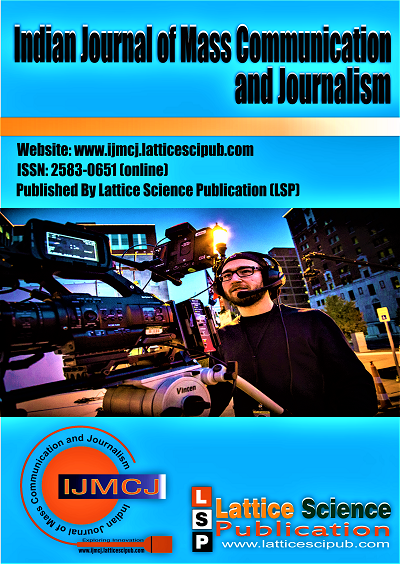Communication for SDG 3: An Analysis of Strategies and Campaigns of Developmental Agencies in Jharkhand
Main Article Content
Abstract
Effective communication techniques are crucial for promoting health and well-being in developmental efforts aimed at achieving Sustainable Development Goal 3 (SDG 3), particularly in challenging states like Jharkhand, India. This study examines the communication tactics employed by a few Jharkhand-based NGOs and agencies to achieve the goals of Sustainable Development Goal 3, and explores potential implementation issues. The study uses a mixed-method approach and descriptive research design to interview representatives of specific NGOs (Breakthrough, Ekjut, Nischay Foundation, ASHA, CINI, UNICEF) in-depth. Qualitative insights into communication tactics highlight prevalent behaviours, obstacles, and outcomes. The results show that NGOs employ a range of communication tactics, including edutainment, community engagement, and the utilisation of both traditional and digital media. Participation in the community is essential for promoting trust and changing behaviour. Language differences, geographical restrictions, poor infrastructure, and cultural traditions that obstruct health education are among the top challenges.
Downloads
Article Details

This work is licensed under a Creative Commons Attribution-NonCommercial-NoDerivatives 4.0 International License.
How to Cite
References
Asi, Y.M. and Williams, C., 2018. The role of digital health in making progress toward Sustainable Development Goal (SDG) 3 in conflict-affected populations. International Journal of Medical Informatics, 114, pp.114–120. DOI: https://doi.org/10.1016/j.ijmedinf.2017.11.003
Benedetti, F. and Crippa, A., 2021. Social Media Visibility of Human Rights NGOs: Strategies and Impacts. Information, Communication & Society, 24(3), pp.412–429. DOI: https://doi.org/10.1080/1369118X.2019.1657165
Bhandari, R. and Mahajan, P., 2022. Strategic communication and branding for NGOs: The case of development organizations in India. Journal of Communication Management, 26(1), pp.25–42. DOI: https://doi.org/10.1108/JCOM-06-2021-0050
Crack, A.M., 2018. Language, listening and learning: Critically reflective accountability for INGOs. International Journal of Development Education and Global Learning, 10(2), pp.174–187. DOI: https://doi.org/10.18546/IJDEGL.10.2.06
Duong, H.T., 2017. Fourth generation NGOs: Communication strategies in social campaigning and resource mobilization. Journal of Nonprofit & Public Sector Marketing, 29(2), pp.119–147. DOI: https://doi.org/10.1080/10495142.2017.1293583
Feng, H. and Zhang, Q., 2018. Legitimisation communication tactics of environmental NGOs in China: A case study of Greenpeace. Global Media Journal, 16(31), p.1. Available at: http://www.globalmediajournal.com/open-access/legitimization-communication-tactics-of-environmental-ngos-in-china-a-case-study-of-greenpeace.php?aid=87286
Hege, E. and Demailly, D., 2018. NGO mobilisation around the SDGs. Studies (01). Available at: https://www.issuelab.org/resources/29778/29778.pdf
Kaur Dhaliwal, 2019. Health in Sustainable Development Goals: Issues before India. Research Journal of Humanities and Social Sciences, 10(2), pp.24–30. Available at: https://rjhssonline.com/HTML_Papers/Research%20Journal%20of%20Humanities%20and%20Social%20Sciences__PID__2019-10-2-6.html
Leal, P.A. and Opp, R.J., 2020. Contesting Development: NGOs and Critical Engagement with the SDGs. Third World Quarterly, 41(5), pp.745–763. DOI: https://doi.org/10.1080/01436597.2019.1702451
Ruggerio, C.A., 2021. Sustainability and sustainable development: A review of principles and definitions. Science of the Total Environment, 786, 147481. DOI: https://doi.org/10.1016/j.scitotenv.2021.147481
Smith, J., Buse, K. and Gordon, C., 2016. Civil society: The catalyst for ensuring health in the age of sustainable development. Globalization and Health, 12(1), pp.1–6. DOI: https://doi.org/10.1186/s12992-016-0178-4





